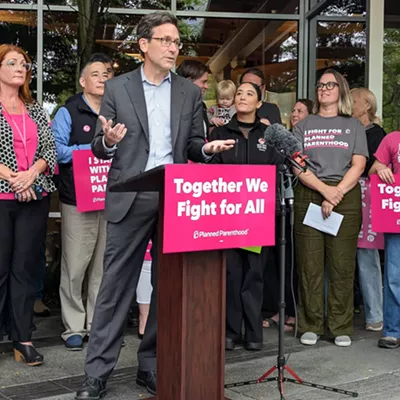THE GERITOL SOLUTION
Named after the iron-rich geriatric dietary supplement, the so-called "Geritol solution" involves dumping tons of iron dust into the ocean to aid the growth of giant algae blooms, which have been shown in smaller settings to suck carbon dioxide out of the air. The trick, many believe, would be using enough of the dust to make a dent in air quality while not using so much that it kills everything in the ocean. They better be careful with that one.
THE ENERGIZER SOLUTION
In August of last year, a small Irish technology company announced that it had developed a perpetual motion device that produced free, clean and constant energy -- in utter defiance of the laws of thermodynamics -- and took out a full-paged ad in the Economist, challenging the scientific community to test its claims. The company's CEO says a jury of 22 credible scientists has been selected to analyze the device, called the "Orbo," but demonstrations of the device, scheduled for July of this year, were scuttled after "technical difficulties."
THE VEGETARIAN SOLUTION
Ask the rabid vegetarians with the People for the Ethical Treatment of Animals (PETA) what the leading cause of global warming is and they'll tell you: meat. Or at least the emissions created from growing, housing, killing and shipping livestock. They're wrong -- burnt fossil fuels are the No. 1 culprit. But they're surprisingly close. A 2006 report from the United Nations found that livestock accounts for 18 percent of global warming emissions, which, as Salon.com points out, is more than the emissions of the entire transportation sector. In America, it's closer to six percent of the share of emissions, but livestock production has also been blamed for a host of other environmental problems, including deforestation, water pollution and acid rain. This is not to mention the methane factor. The belching and farting of cows and other livestock produces a third of all human-caused methane production in the world, according to Salon.
Of course, convincing the world to quit meat will be as likely as getting them out of their cars. But some believe cutting down on beef, pork and dairy (the production of which creates more emissions than, say, chicken) could help. In Australia, Greenpeace is urging Australians to cut back on beef in favor of more kangaroo, which produce less methane and require less land clearing.
THE REALITY
As we mentioned in last week's issue, evidence suggests that we need to reduce our CO2 emissions by at least 70 percent by 2050 to stabilize the global climate at around a five-degree increase over today's average. Switching to kangaroo meat probably isn't going to get us there. Neither is a man-made Krakatoa, or a solar umbrella that would take 20 million rockets to launch. There's no silver bullet. Instead, it'll take a billion tiny BBs to reduce emissions and keep the planet cooler.














